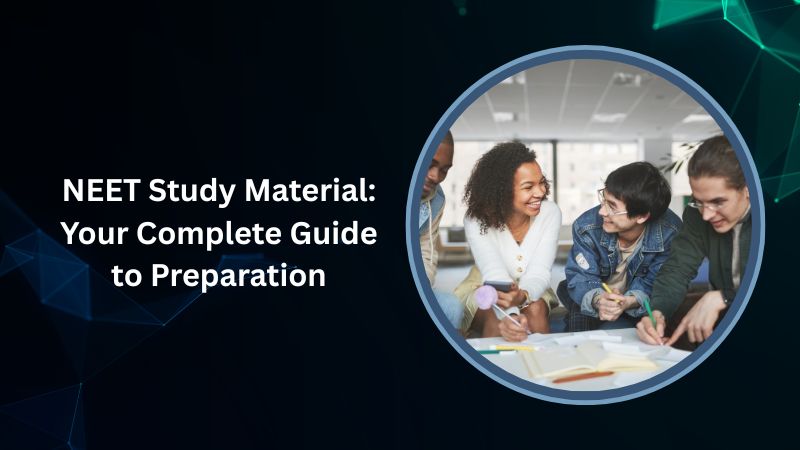


“Discover the best NEET study material with NCERT, reference books, ebooks, and digital resources. A complete guide for effective NEET preparation.”
For every NEET aspirant, selecting the right study material is as important as following a disciplined preparation strategy. Whether you are preparing in India or from abroad, the study resources you choose determine your level of confidence and clarity before the exam. Many students today also look for digital options such as NEET study material download to access notes, books, and practice tests online. This flexibility ensures that students can revise anywhere, anytime, without carrying bulky books.
The NEET exam is based on the NCERT syllabus of Class 11 and Class 12, covering Physics, Chemistry, and Biology. While NCERT books are the backbone of preparation, they are not enough on their own. Students need additional guides, question banks, and mock tests to practice application-based problems. Quality study material ensures:
Concept clarity with simple explanations.
Ample practice through solved examples and exercises.
Coverage of important topics highlighted in past exams.
A balance between theory, application, and revision.
Without proper material, even bright students may waste time juggling multiple sources or miss out on crucial chapters.
Biology forms the largest part of the NEET exam, carrying nearly 50% weightage. NCERT Biology books for Class 11 and 12 are the most important. In addition, reference books like Trueman’s Biology and Objective Biology by Dinesh are useful for extra practice. Students should also use previous year question banks, as many biology questions are directly inspired by past NEET papers.
Physics is often considered the toughest section by NEET aspirants. For basics, NCERT Physics is a must. For numerical problem-solving, Concepts of Physics by H.C. Verma and Objective Physics by DC Pandey are excellent resources. Daily problem practice is essential because Physics requires speed and accuracy.
Chemistry is divided into Physical, Organic, and Inorganic. NCERT Chemistry provides a strong foundation, but additional references like Physical Chemistry by O.P. Tandon and Modern’s ABC of Chemistry help in deeper practice. Organic Chemistry requires special attention to reactions and mechanisms, which can be mastered with consistent revision.
When it comes to NEET preparation, not all chapters carry equal weight. A focused study material set often highlights high-yield chapters. For example:
Biology: Human Physiology, Genetics, Ecology, Plant Physiology, and Biotechnology.
Physics: Mechanics, Thermodynamics, Current Electricity, Modern Physics, and Optics.
Chemistry: Chemical Bonding, Coordination Compounds, Thermodynamics, Hydrocarbons, and Biomolecules.
Using targeted study resources helps aspirants maximize marks with less stress.
In today’s time, online platforms have become an essential part of NEET preparation. Digital study material includes:
Video Lectures: For better concept visualization.
Chapter-Wise PDFs: Summarized notes for quick revision.
Test Series: To simulate the real exam environment.
E-books: Accessible anytime, especially useful for NRI students preparing outside India.
Many institutes also provide topic-wise practice questions and detailed solutions. These digital resources make preparation more flexible and reduce dependency on heavy textbooks.
Here are some tips to select the most effective NEET study material:
Stick to NCERT First: Complete NCERT for both classes before moving to advanced guides.
One Reference Book Per Subject: Avoid juggling multiple books; it wastes time and creates confusion.
Focus on Practice: Prioritize material with solved examples and question banks.
Use Previous Year Papers: They give insight into exam trends and question types.
Revise Regularly: Select notes or summaries that allow repeated revision in less time.
Along with books, solving mock tests and previous year papers is crucial. Many toppers suggest dedicating the last three months only to revision and test practice. Good study material always includes topic-wise question banks with detailed solutions.
Mock tests not only build confidence but also improve time management — a key skill in the NEET exam where students have just 3 hours to attempt 180 questions.
For NRI students or those living abroad, carrying multiple physical books isn’t always practical. That’s where digital learning platforms come in handy. Institutes provide PDF notes, video lessons, and online test series that can be accessed anywhere. This ensures that aspirants outside India are not left behind and can prepare with the same efficiency as students in India.
